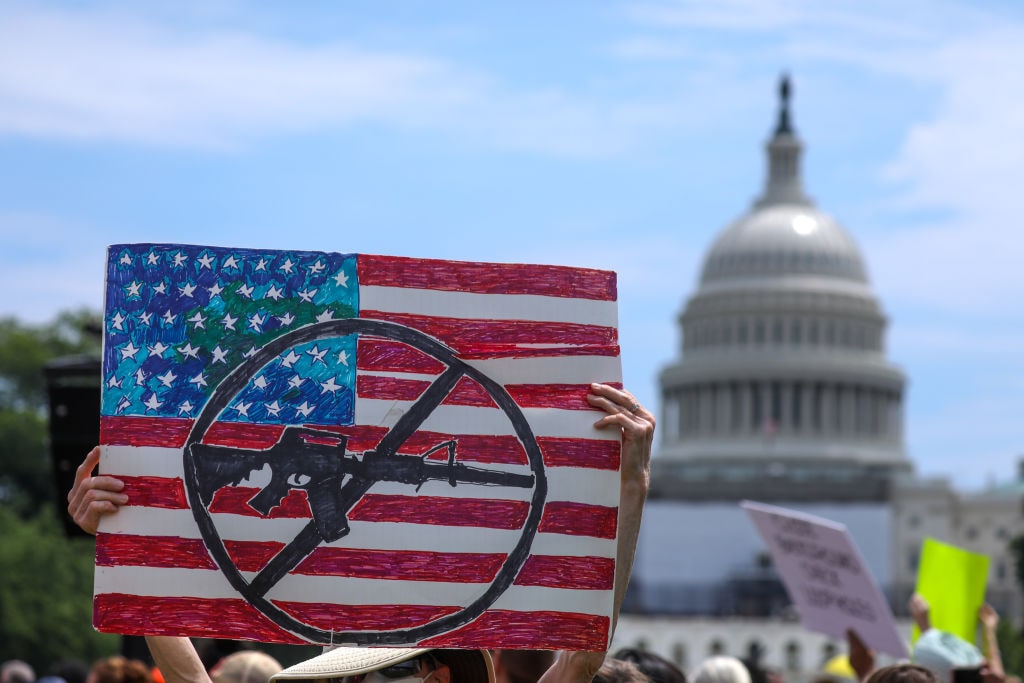
(Photo by Yasin Ozturk/Anadolu Agency via Getty Images)
House Democrats passed two federal gun control bills June 8 and 9. Both saw slight GOP support but ultimately passed mostly along party lines – and both, conventional wisdom would have it, should be doomed in the Senate. But are they? While the combined package affects sweeping changes, it falls far short of what was expected from the Democrat-controlled House. And rumor has it there are plenty of Senate Republicans who might be willing to sign on to a bipartisan agreement, depending on the details of the proposed deal.
Red Flags in the Law
Wednesday’s bill, the narrower of the two, also has the better chance of becoming law. The Federal Extreme Risk Protection Order Act passed the House 224-202, with five Republicans supporting and another two not voting – and just one Democrat opposing. At its core, the bill essentially nationalizes the red-flag laws already in place in many states, authorizing federal courts to issue the gun confiscation orders should a relative, household member, or police officer report someone as a threat to themselves or others.
However, it doesn’t stop there. “The bill also expands the categories of persons who are prohibited from purchasing, shipping, transporting, possessing, or receiving a firearm or ammunition,” the official summary concludes. “Specifically, it adds, as a new category, persons who are subject to an extreme risk protection order.” Down toward the end of the bill text, right before the Severability clause, is a list of edits to Section 922 of title 18, United States Code. That’s the text that establishes prohibited persons, and this section of the act adds subjects of extreme risk protection orders to that list. This is significant, as it doesn’t just authorize police to take away the guns a person owns at the time of the order. It goes a step farther, as it’s a crime in and of itself for a prohibited person to possess a firearm or ammunition – effectively placing flagged individuals who have committed no crime in the same camp as convicted felons.
Gun Control Buffet
Thursday’s bill, the much broader one, will likely face more resistance in the Senate. The Protecting Our Kids Act is a veritable buffet of restrictions on the right to keep and bear arms. It doesn’t include a ban on so-called assault weapons – but it has just about everything else the Democrats have asked for. Clearing the House 223-204, this bill also received support from five Republicans and was rejected by two Democrats. Just one Republican abstained from voting this time, however.

The very first thing the bill covers is raising the age to purchase from 18 to 21 for any centerfire semiautomatic rifle or shotgun that can accept an ammunition feeding device with a capacity of more than five rounds. Active-duty members of the armed forces and full-time government employees who are authorized to carry a firearm as part of the job are exempted.
The act includes a ban on the manufacture, sale, or possession of any firearm that doesn’t include a serial number – AKA “ghost guns.” The prohibition ends with “in or affecting interstate or foreign commerce,” which might lead non-commercial individuals to reckon they’re okay so long as they aren’t selling. However, according to the DOJ Archives, “Interstate Commerce means commerce or travel between states, territories, and possessions of the United States.” Then there’s this after the definition for foreign commerce: “Commerce includes among other things: travel; trade; transportation and communication.” So simply traveling across state lines, transporting such a firearm, could constitute interstate commerce, depending on how prosecutors decide to interpret the code. “It is not necessary for the government to show that the defendant actually intended or anticipated an affect on interstate or foreign commerce,” the explanation continues. “All that is necessary is that the government prove that the defendant’s actions affected interstate or foreign commerce no matter how minimal.”
The next section in the act establishes a safe storage requirement across the nation, with specific penalties including fines and – should a minor get their hands on a firearm and cause injury or death – prison time for those who fail to comply. Right after this, there’s a legislative ban on bump stocks, which further broadens the term to include any device – stock accessory or otherwise – that increases the rate of fire.
Finally, though there’s no assault weapons ban in this particular legislation, the last section outlaws any detachable magazine that can hold more than ten rounds. In addition to a ban on sales, the act would fund buy-back programs nationwide for the larger capacity magazines.
Change on the Horizon, or Status Quo?
In the Senate, a bipartisan group of lawmakers was unable to reach a deal on Thursday, but neither side seems to be actively trying to derail the discussions. Some measures, like the House red-flag law, might stand a chance, as there is a potential base, according to one senator who spoke to Politico, of anywhere from 15 to 25 Republicans who might sign on to such a measure. Major expansions of background checks, raising the minimum age for buying any guns, and another assault weapon ban, however, are reportedly entirely off the table – meaning the Protecting Our Kids Act is as good as dead.
Sen. Joe Manchin (D-WV), who has been a thorn in the side of progressives and those who toe the party line, actually won’t be a problem. He recently said that he is onboard with these changes, and that he might even support an actual assault weapon ban, depending on the specifics. With all 50 Democrat Senators backing these proposals, the success of at least one of these bills likely comes down to whether Sen. Manchin will maintain his stance in defense of the filibuster.
Remember to check out the web’s best conservative news aggregator
Whatfinger.com — the #1 Alternative to the Drudge

